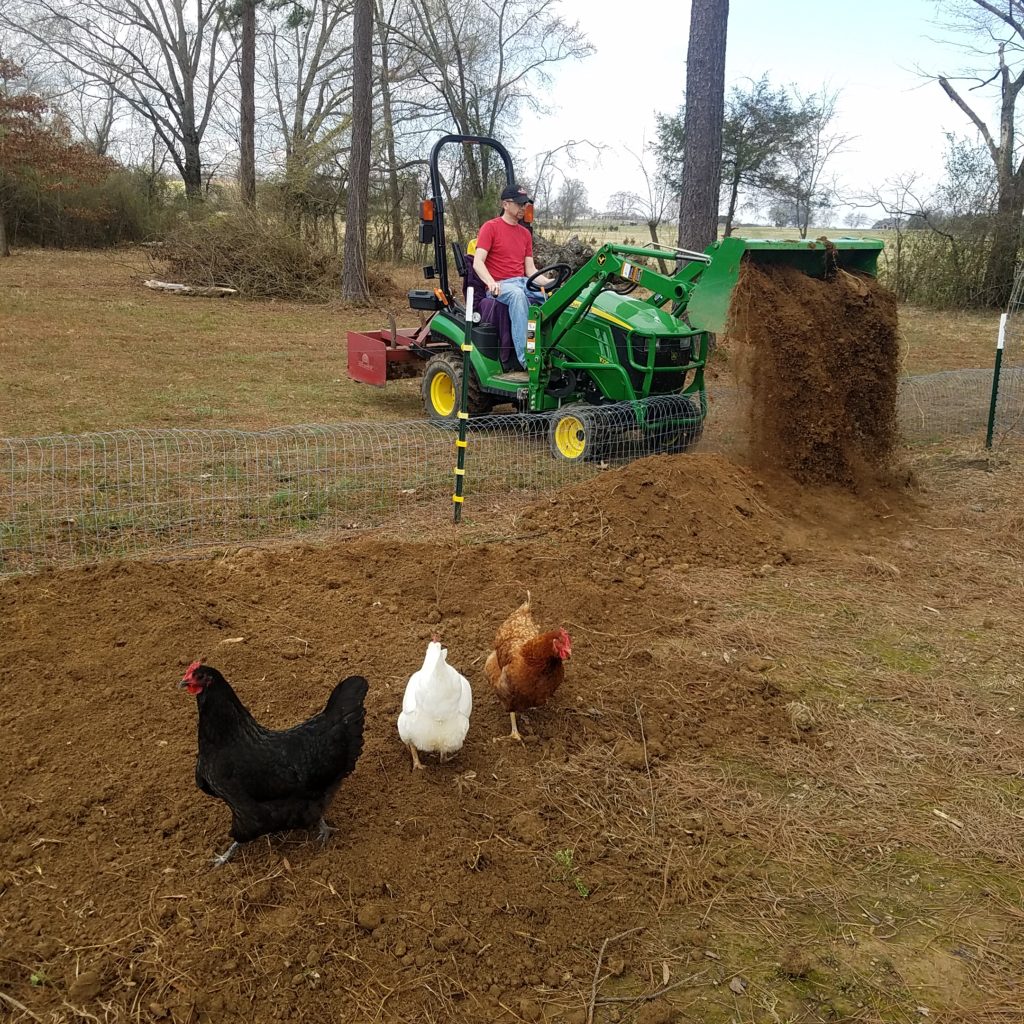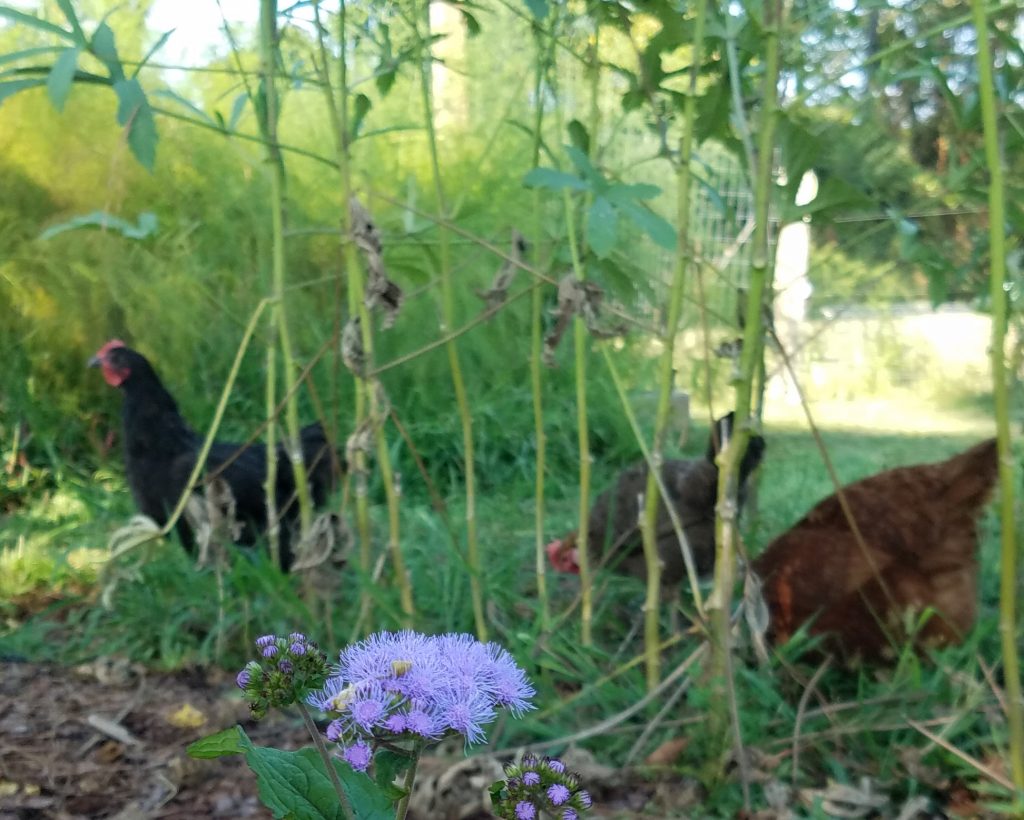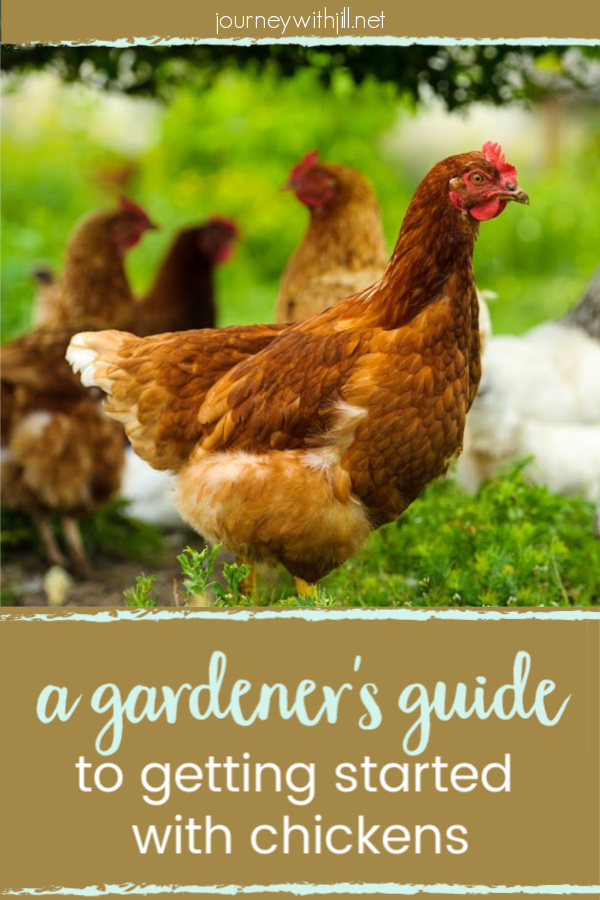A Gardener’s Guide to Getting Started with Chickens
Have you ever wondered why gardeners so often have chickens? My family brought in our first flock of chickens seven years ago, added a second a few years later, and a third flock joined us in 2020! As cute and fun as they are, though, chickens do wonderful things for my garden. The eggs are just a bonus.

If you’ve ever considered adding a couple of hens (or more) to your garden, it may seem overwhelming to know how to get started.
I had the opportunity of interviewing Nicole Gennetta from the Backyard Bounty Podcast and Heritage Acres Market about raising chickens. She has been raising chickens her whole life so she had a lot to offer beginners looking to add a small flock. In this episode of the Beginner’s Garden Podcast, we explore what it looks like to introduce chickens to your garden endeavor. Click below to listen or continue reading.
*links below may contain affiliate links
How to get started with backyard chickens
The first thing you should do is check with your local government and HOA and make sure you know what is permitted in your area. In some areas, chickens are outright not permitted, there may be a limit on the number of chickens you have, or you may be allowed hens but or not a rooster. (However, in some places there are some exceptions for kids who are members of 4-H.) Unless you know the potential restrictions, check with your local ordinances.
After you’re sure you can legally raise chickens, the best way to start is just to get started! One thing many people get hung up on is the coop. It’s always better to have a bigger coop than you think you’ll need so you have room to add more chickens later (yes, it’s a definite possibility!).

Pre-made chicken coops that you may purchase from your local garden or farm supply store can be a good entry-level option. But be aware that they are generally not large or sturdy enough to last a long time. A better option would be to build one or have one built for you. But, if the pre-made coop is your only option, I recommend going with it rather than not trying chickens at all!
Do I start with baby chicks or chickens?
It’s tempting to buy the cute baby chicks at the store, but for the beginner, it is much easier to purchase a pullet (a hen less than one year old). A pullet will have all of its feathers and can withstand the weather. With baby chicks, you have to care for them inside until the feathers come in. I did this, and it was a very fun to watch the baby chicks grow up (my kids loved it), but there are some steps involved in those early months.

Another benefit to purchasing pullets is that you will also get eggs sooner because the birds are more mature. (My hens started laying at about 5-6 months old.) Make sure to find a reputable breeder in your area. Look for the NPIP, National Poultry Improvement Plan, certification so you know that the birds are tested for the avian flu and other common ailments.
What is the best chicken for beginners?
Some breeds are better for beginners than others. Generally, stay away from exotic breeds. You will be safe with any of the breeds that your local store would carry. They carry customer favorites like Buff Orpington, Rhode Island Reds, Brahmas, Ostrelorps, Jersey Giants, or Speckled Sussex. These are known to be friendly and good egg layers.

Supplies you need to start raising chickens
First, you need a coop, which is the house they sleep in at night and a place for them to lay their eggs. You might consider a covered run, an area where they can be safe. Not everyone has the space to allow chickens to free-range, but generally, the more space you can give them, the healthier they are and the less you have to supplement with feed. In the absence of a run, coops come built with a limited amount of space for hens to move around.

Second, you need a feeder and a waterer. One good option is a treadle feeder. With this, the chickens stand on for it to open and it keeps pests out. Many beginners opt for a hanging feeder like this one. The main drawback to this is sometimes the hens will fly onto the feeder and the feed will spill onto the ground.
There are several types of waterers, but this waterer with built-in poultry nipples is a great option because it keeps the water clean.
What to expect from your chickens’ life cycle
After an egg is laid, it incubates for about 21 days before hatching. In 5-10 weeks the baby chicks will be fully feathered and are able to live outside. When they are 5-12 months old (depending on the breed), hens will start laying eggs. For the first year, each hen may lay up to 5-6 eggs per week, but this production will slow as they age. After the first year, chickens will molt in the fall (they lose their feathers, then grow new ones). During this molt and throughout the winter, most breeds with either stop or slow their laying. With spring comes the resumption of egg production. Most breeds lay for 4-5 years then significantly drop off production. They can live up to 10-14 years.
Keep in mind, if you only have hens, the eggs your hens lay will not be fertilized, which means those eggs would never hatch into baby chicks. But if you do have a rooster in the flock, those eggs will be fertilized. As long as you remove eggs daily (or every few days), you would never know the difference between a fertilized and unfertilized egg.

How to protect your chickens from predators
Especially when you want your chickens to free-range for parts of the year, it is important to think about how to keep them safe. While it will vary depending on your area and what predators you have, there are some principles to think about. A covered run is very helpful, it needs to be fully enclosed and skirted, which means 2 feet of wire around the outside to keep dogs and other animals from getting in. If you don’t have a run, you will want a lock on the door of the coup so animals can’t get in. You will want to only let them out when you are out with them.

Common chicken diseases
Chickens are susceptible to respiratory illnesses that are potentially deadly. But more commonly, they tend to get themselves into trouble and injure themselves. Bumblefoot is common where they get a cut on their foot, which results in a staph infection. Tapeworms can also be a problem because they are transmitted by flies. What you will have to deal with will depend on your location. Nicole’s Backyard Poultry Health Guide is a helpful resource for diagnosing and treating your chickens.

How to use chickens in your garden
Chickens can be a great addition to your garden, but you also have to watch out for where you let them forage. If there is somewhere you don’t want them to be, like among young crops, make sure it is fenced off. They can decimate a new planting in a day or less.
Free ranging your chickens for pest control is helpful especially at the end of the summer when pests are still active but when your garden has started to slow down. They are particularly good at eating grasshoppers.
Chicken manure is great in compost or as a tea, but it is high in nitrogen so it is best not to put it directly on the plants. It is safe to put on your beds in the fall so that it breaks down before you plant new crops in the spring. Be sure to allow 3-4 months after applying fresh chicken manure before you plant.
Chickens are also great for consuming plants that you don’t want to eat or for those you pull from the garden. They are great weeders and a way to dispose of larger chucks of plant debris that may be harder to include in your compost pile.
Backyard chickens bring such value to the garden, and once you get started, you’ll learn how valuable they are!
Do you get overwhelmed with garden planning?

Subscribe here for my best tips to plan your garden in just 7 days -- all for FREE.
Plus, I'll send you my "In the Garden E-mail" on Fridays, periodic updates on garden resources relevant to you, and you'll receive access to my entire bank of free garden downloads!
You are also agreeing to our privacy policy.

